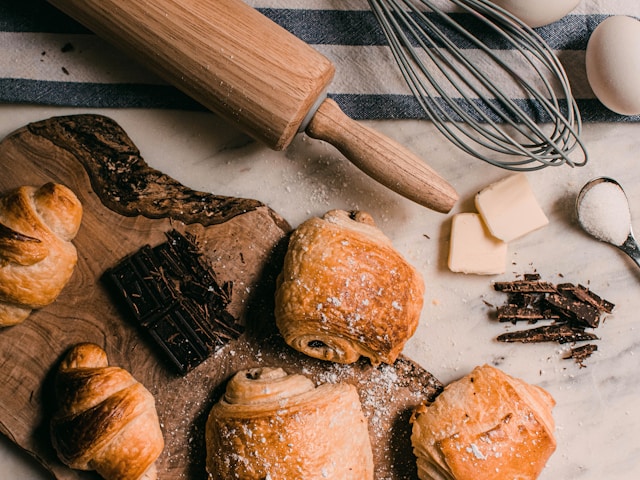8 Useful Tips to Improve Your Pastry Skills
Baking is a form of art that entails a lot of accuracy, time, and a little bit of innovation in the process.
Whether you are a beginner in pastry making or a home baker who wants to improve on their baking here are some tips that will help you take your baking to the next level. Below are 8 Useful Tips to Improve Your Pastry Skills that will assist you in enhancing your pastry skills and making any person who tastes your creations happy.
Master the Basics
It is therefore important to understand the basics of pastry making to be able to excel. First of all, it is recommended to get acquainted with the simplest recipes and methods of cooking. Understand the techniques of making different types of doughs including shortcrust, puff, and choux pastry. Each type has its own characteristics and applications, and learning them will give a good start for more complicated works.
It is always good to go over the recipes and techniques several times because the more you do it the better you get at it. Be particular with things like the texture of the dough, the time it takes to bake and the temperature. The more you practice, the more you gain confidence on what you are doing or the skills you are mastering.
Invest in Quality Tools
Choosing the proper equipment is very important when it comes to pastries and baking. Ensure that you get the best baking tools including rolling pins, pastry brushes, silicone baking sheets, and accurate measuring spoons. Not only are high-quality tools more long-lasting, but they also give better outcomes.
Also, the size and type of baking pans used can also influence the outcome of your pastries in one way or the other. For example, choosing the right tart pan or pie dish will make the tart bake evenly and look good when served. Do not compromise on these items because they can significantly affect the quality of your output.
Keep Your Ingredients Cold
In the preparation of pastries especially those that contain butter, it is important to have cold ingredients. Cold butter is used to make layers in doughs such as puff pastry and croissants. To do this, ensure that your butter, flour and even the bowls you will use are cold before you begin.
If the dough gets warm while working it becomes sticky and it becomes very hard to handle it. In such cases, it is recommended to place it in the refrigerator for a few minutes before proceeding with the process. Another factor that can also be of benefit is keeping the kitchen as cool as possible, especially during summer.
Practice Proper Dough Handling
This is an important factor when it comes to the preparation of pastries because the dough has to be handled gently to get the right texture and feel. Do not over knead the dough as this will result to a tough and dense bread. While rolling the dough, one should apply a gentle pressure so as not to cause the dough to tear and at the same time, make sure that the dough is of equal thickness.
It is also necessary to allow the dough to relax from time to time. A lot of recipes require the dough to be refrigerated at some point to allow the gluten to rest and make the finished product better. It is essential to adhere to the following steps to achieve the tender, melt-in-your-mouth pastry.
Measure Ingredients Accurately
In pastry making, one has to be very particular with the measurements. While in cooking, there are times that you can add or subtract some ingredients, baking calls for specific proportions of each ingredient. It is recommended to use a digital scale to measure your ingredients because this method is more precise than the volume.
Adhere strictly to the recipe and ensure that you observe things such as the sequence of adding the ingredients and other procedures. Following the measurements and the recipe to the letter will give you consistent results and if something goes wrong, you will be able to identify where you went wrong easily.
Learn the Art of Layering
Layering is a technique that is used to increase the complexity and the texture of pastries. Learning this art can help take your creations to the next level. For example, in puff pastry and croissant preparation, the dough is folded and rolled severally and this forms a laminated structure that puffs up when baked.
Try out various layering methods including the use of fillings or toppings in between the layers. It can also give a decorative look and improve the taste of your pastries. It takes time and lots of practice to master this particular skill.
Try Out New Tastes and Feel
Although it is crucial to know the basic recipes, do not be afraid to try something new and add different tastes and consistencies. Experiment with the ingredients like herbs, spices, and fruits to come up with new and interesting pastries. Adding something out of the ordinary can catch the attention of the taste testers in a positive manner.
Another factor that needs to be considered is the combination of tastes and consistencies. For instance, the combination of a flaky pastry crust with a velvety texture of the filling can be quite appealing. Try and taste as many recipes as possible in order to find the right balance of ingredients.
Discover Online Resources
The internet is a goldmine of information for anyone who wants to become a pastry chef. Blogs, video tutorials, and forums are also helpful in getting ideas and information from other people. Most of the professional pastry chefs give their insights and ideas and the viewers get a sneak peek into their working style.
In the digital environment, the availability of international content is a real revolution. A VPN (Virtual Private Network) lets you search for more resources from other countries. This can open you to different pastry types and products, which will expand your cooking horizons. Make sure you are using a good VPN to watch the content safely and securely.
Keep Practicing and Stay Patient
It is always important to note that mastering the art of pastries requires time and effort. It is recommended to practice regularly to improve the skills and gain confidence in their application. Never give up; instead, consider every failure as a step towards making the process better and getting closer to mastery.
Patience is equally important. Certain types of dough such as the sour dough or laminated doughs take longer to prepare. Learn to love the process and the journey and understand that every single step that you are taking is getting you closer to the ideal pastry.
With these tips in mind, you are on the right track to becoming a professional pastry chef. So, keep on experimenting, learning and, of course, enjoying the sweet results of your hard work. You will also find a wealth of information on the CakeFlix Baking section.

